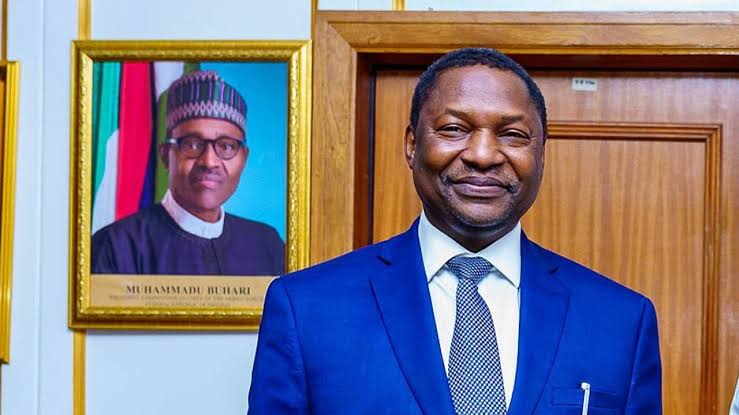It’s a known fact, that the well-being of any country is dependent on a functional and efficient judicial system, guided by transparency and accountability, and Nigeria is no exception. No doubt, since the country returned to democracy in 1999, the judiciary has had its own fair share of the challenges. While all the problems facing the sector may not have been addressed, attention is being given to each of the problem at a time.
The truth remains that if we must have a good country where rule of law is the guiding principle, then, a good justice system is an essential ingredient. It is factual that to build a nation where peace and justice reigns, there must also be proper functioning of all the compartments that makes up that nation, particularly the justice sector.
This also , is without forgetting the fact that to have a sound justice sector for any nation, the indices of accountability, accessibility, transparency and respectability must present.
As we are aware, transparency, accountability amongst others have reopened central stage in modern day administration as strategies for promoting good governance.
Before the present administration came into office, some of these indices were lacking in the justice sector , but as it stands, there has been remarkable improvement in the administration of justice sector within the period under review.
In the last five years or more, the justice sector witnessed both high and low moments. So many events happened that shaped the sector. While some were positive and commendable, others were not pleasant, hence, received condemnation and knocks.
Interestingly, even the Attorney – general of the Federation and Minister of Justice, Abubakar Malami, SAN, has reiterated severally that the justice sector was laced with challenges and shortcomings prior to the coming of the President Muhammadu Buhari’s led government.
Malami once said, ”There are actually challenges but the PMB’s led government has identified , looked at them, confronted and have surmounted them.”
LEADERSHIP Weekend observes that despite the positive changes registered in the justice sector in the last six years , among the disturbing issues that have continued to generate controversy in the sector are centered on the recovery of government assets , openness and transparency of its budget.
Barely four days ago, the AGF, Malami challenged the Nigerian judiciary to be transparent and accountable in the spending of the funds allocated to it in its annual budgets.
Mr Malami, said the federal government was not in a position to know whether the judiciary’s budget allocation was inadequate due to the opacity that characterises its financial records.
Commendably, this is the first time the judiciary will be openly confronted by a top member of the executive arm of government about the age-long secrecy of its budgets.
Interestingly, this open confrontation by Malami about the justice sector books not being open, has sparked commendations as lawyers and senior advocates have acknowledged that until the three arms of government allow “the operation of an open government partnership arrangement, the nation can never be in a position to identify to what extent the budgetary provision made is inadequate.
LEADERSHIP weekend reports that while the budget of the sector at the federal level seem to be open and transparent, due to the openness of Malami, an A-list minister in the PMB’s administration, same cannot be said of the states.
A lawyer and fiscal accountability expert, William Ebei said poor budgetary allocation to the judiciary is not a justification for the lack of transparency and probity.
Most of the state governors still believe that the judiciary, which is th third and separate arm of government should come under their watch , cap in hand to beg for what is duly and constitutionally provided for them.
Malami, pinpointed this anomaly as the main reason he advised President Buhari to make Executive Order 10, to compel state governors to release what is due to the judiciary in states.
One of the major responsibilities of the office of the AGF is to among other things counsel the government in all legal matters. It has the major role of promoting and enhancing justice for all, the rule of law and good governance.
Without doubt, the AGF has and is still discharging his mandate effectively and creditably well. This is evident in the sound and qualitative legal opinions he has raised , particularly , in the areas of economy, politics, health, security, signing of mutual agreements, memoranda of understanding and international cooperation. But for some of his sound legal views on issues, especially those bordeing on sensitive matters, the country would have found itself in chaos.
Malami, while speaking at the Justice Sector Reform Summit 2022, organised by the Nigerian Bar Association, NBA, said there was need for the judiciary to embrace the open government initiative by keeping its financial books open for public scrutiny. He added that the President Muhammadu Buhari-led government had prioritised the financial independence of the judiciary by issuing the Executive Order 10.
While challenging the judiciary to stop shrouding its budget in secrecy to enable the federal government determine if the N104billion allocated to the sector is sufficient, he charged them to emulate the legislature and executive by subjecting themselves for scrutiny.
Malami urged the judiciary to live up to its responsibility and support initiative that will bring the desired result in administration of justice the country.
Apart from being outspoken for a better judiciary, the controversy surrounding the asset recovery was resolved when he promptly set up Asset Recovery Committee as directed by President Buhari.
The president had directed that all assets forfeited to the federal government be disposed off and accounted for. The AGF immediately swung into action and set up a committee, headed by the immediate past solicitor-general of the federation and permanent secretary, ministry of justice, Dayo Apata.
Malami had in November 2020, inaugurated the Inter-ministerial committee in compliance with the president’s directive that the committee dispose off all forfeited assets within six months
Malami had explained that the setting up of the committee was borne out of the president’s directive in October 2018 following recommendations of the Presidential Audit Committee on Recovery and Management of Stolen Assets and a need for efficient management of the assets.
The AGF was quoted thus, “The committee is set up to ensure proper coordination of the disposal of the federal government’s assets and to promote harmonised and transparent procedures to safeguard recovered assets in line with the anti-corruption drive of the PMB led administration.
He also said , ”Your mandate is to ensure the expedient disposal of all FGN forfeited assets and generate revenue for the federal government. Accordingly, I wish to solicit the cooperation of all members of the Inter-ministerial committee in that respect.”
In his response, Dayo Apata had assured the public of transparency in the disposal of recovered assets
He revealed that the committee kick-started the process on February 1, 2021, and had made publications in the Federal Tenders Journal and two national newspapers
Some lawyers who spoke to LEADERSHIP Weekend, commended the AGF ‘s guts and commitment towards ensuring openness and accountablility of the said committee
A lawyer, Abdul Balogun, said when carrying out duties like disposing assets forfeited to the government, the issue of trust is key and I give it to the AGF for living up to expectation.
He said such assignments were carried out in the past by some of his (Malami) predecessors but added that those assets, found their way back into the hands of those who had illegally acquired them.
Another lawyer, Fidelis Abu, commended the federal government for disposing off the assets in a transparent and orderly manner.
According to him, ” If not for the openness preached by Malami, this huge assignment would have just been another waste of time and resources. I tell you that those assets would have found their way back to the corrupt owners.
”I was present at the venue where the assets were being disposed off and I saw the orderly and transparent manner the process went. It wasn’t just another business as usual. Due process was followed during the exercise.’
The government, through the office of the AGF was also able to build Global Consensus on Assets Recovery.
During the ninth session of the Conference of States Parties to the United Nations Convention Against Corruption (UNCAC) in Sharm El Sheik, Egypt, last year, the AGF said with support from 19 countries across different continents of the globe, Nigeria got immense support in its submitted draft resolution.
He said the draft was titled “Enhancing access to and the use of Beneficial Ownership Information to facilitate the identification, recovery and return of assets “, to further highlight the importance of beneficial ownership transparency.
Malami said significant progress has been recorded in the efforts to combat corruption in Nigeria.
”We have continued to make significant progress in our efforts to prevent and combat corruption, block leakages and recover our stolen assets” Malami said.
Abu acknowledged that apart from the excellent work done by the AGF in the area of asset recovery and disposal, reforms were brought into the justice sector by the AGF.
He said the COVID-19 pandemic forced many countries around the world to adopt a new way of doing things which were never envisaged before. According to him, one of them is the introduction of virtual court sitting in the country by Malami, through collaborative efforts with relevant local and international stakeholders.
Virtual court sitting facilities, the first of its kind was commissioned in Correctional Centre in Kuje, Abuja, last year by Malami.
The AGF explained then that the deployment of a virtual court sitting technology in correctional facilities was aimed at ensuring speedy dispensation of justice and decongestion of custodial centres in the country.
His words, “It would also eliminate the issue of difficulties in conveying the inmates to court and would further ensure the safety and security of the inmates and law enforcement officers. We are no longer constrained by mobility, space and time in the justice delivery on account of accommodation of the virtual court sitting facilities and deployment of incidental technology,” Malami said.
Having thrown open challenge to the justice sector to redeem the dented image of the sector which critics believe have tainted financial records, Malami added that in carrying out their mandate, there is a need for the sector to be methodical , thorough , open and measured . He stressed that utmost professionalism is required as it would further break the opaque state of corruption in the justice sector



